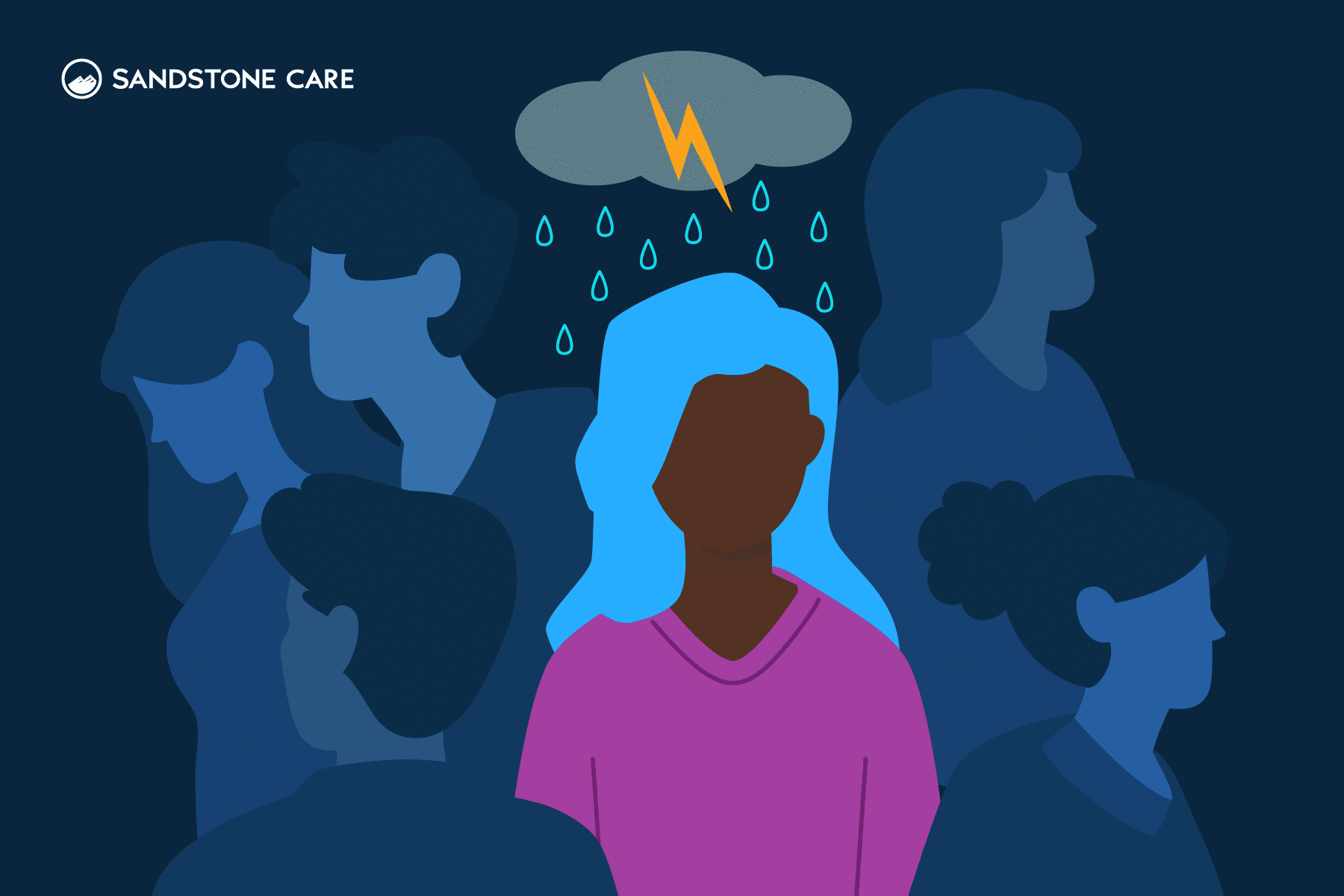Abandonment Issues Meaning
What Are Abandonment Issues?
People who experience abandonment issues typically have a deep-rooted fear of being rejected or neglected.
Many people may think about abandonment issues in the context of a romantic relationship. However, did you know that abandonment fears can affect lots of different kinds of interpersonal relationships within a person’s life?
They can also lead to low self-esteem, struggles with secure attachment, negative thought matters, and overall poor mental well-being.
In many cases, fears of abandonment in adulthood are related to traumatic events from a person’s early childhood. For example, maybe they had a parent or caregiver who was neglectful or rarely present in their life.
In other cases, a person may have experienced the loss of a loved one at a young age, and the trauma of that experience led to this fear.
Struggling with abandonment issues can take a toll on your mental health and well-being. It can make it hard to maintain strong and healthy relationships. However, the good news is that by working with a mental health professional, it is possible to work through these issues and begin to heal.
If you or someone you know is struggling with abandonment issues as a result of negative childhood experiences or other forms of trauma, our team at Sandstone Care can help.
What Do Abandonment Issues Look Like?
Abandonment issues can affect people in different ways. However, in general, they are often associated with a deep fear of rejection, clinginess, or codependency and a need for constant reassurance.
A lot of times, people with abandonment issues may tend to fall into a lot of unhealthy relationships. This may be because they are used to settling for less than what they truly deserve because they are afraid of being alone. In many cases, this is also because they struggle to see their own self-worth.
While many people with abandonment issues tend to be very clingy towards romantic partners, others may struggle to form close relationships with other people altogether.
Abandonment issues are often linked to something called attachment theory, which was developed by a psychologist named John Bowlby. This theory suggests that the relationships we have as infants with our caregivers shape how we act in relationships as adults. If someone feels abandoned early on, it might affect their relationships later in life.
For instance, people who worry a lot about being left might develop what’s known as an anxious attachment style. They might feel insecure and need a lot of reassurance from friends or partners, which can make them seem clingy.
On the other hand, some people might react to abandonment by becoming very independent and emotionally distant, a style called avoidant attachment. They might avoid getting too close to others to protect themselves from being hurt again.
While attachment theory is helpful, it’s not perfect. Critics argue that it simplifies complex behaviors and puts too much focus on early experiences, without enough consideration for how people change over time.
In therapy, these ideas can help start discussions, but everyone’s experience with abandonment and relationships is different and complex.In fact, they may even start to push people away if they feel like they are becoming too close.
This is because they are afraid that the closer they get to someone, the more painful it will be if they get rejected.
What Is Emotional Abandonment?
In the case of emotional abandonment, a person’s loved one may be physically present but they still feel their emotional needs aren’t being met by that person.
This can happen within many different types of relationships, from relationships with family members to romantic relationships. It often leads people to feel as if they’re unvalidated and supported. It can also cause them to experience a lot of different mental health struggles, like loneliness, unworthiness, and poor self-esteem.
What Are the 5 Stages of Abandonment Issues?
The 5 stages of abandonment issues are often identified as shattering, withdrawal, internalizing, rage, and lifting.
The shattering stage can also be described as a period of shock and pain. Consider the emotions that someone goes through when they first experience a breakup. They may feel heartbroken, devastated, and completely caught off guard.
The next stage, withdrawal, is when the individual begins to experience a deep longing to be with the person who left them. This stage can be associated with anxiety and fear over being without the other person. They may feel as if there is no way that they can be happy again without the other person coming back into their life.
Next is internalizing which is a period where the person may find themselves asking themselves, “What did I do wrong?” They begin to blame themselves for the other person leaving even if it wasn’t their fault at all. The person may doubt if they are even worthy of love and their self-esteem may begin to plummet.
The next stage is rage, when the person begins to feel deep anger and resentment towards the person who left them. They may decide that they’re never going to put themselves in a situation where they can get hurt like this again. Maybe they even decide that they aren’t going to trust others moving forward or allow themselves to be vulnerable in any future relationships.
Finally, the last stage is lifting, which is when the person slowly begins to accept what happened and move forward. Over time, they may begin to see things from a different perspective and feel more positive about the future. They may begin to build up their self-confidence and start letting people in again.

Is this blog hitting close to home?
We’re here to help.
Causes of Abandonment Issues
What Causes Abandonment Issues?
People may develop abandonment issues for many different reasons. However, one of the most common causes is feeling rejected or emotionally abandoned during childhood.
This doesn’t necessarily mean that they had a neglectful parent. In some cases, parents may struggle to be emotionally available to their children for complex reasons. For example, they may have been battling with their own mental health challenges like anxiety or depression.
In other cases, this can occur as a result of a parental separation or divorce. If a child watches one of their parents move out of the home because of something like this, they may think that it’s their fault. They may blame themselves and consider themselves to be unlovable.
It is also possible for abandonment issues to happen as a result of experiences much later in life as well. For example, a really painful or unexpected breakup can cause someone to experience abandonment anxiety for years to come. They may have trouble letting people in because they’re afraid of being hurt again.
Why Do I Have Abandonment Issues?
You could have abandonment issues because of traumatic life events like losing a loved one or as a result of certain experiences from childhood.
Some people may also experience abandonment issues after the downfall of an important friendship. This experience can be traumatic and can make it difficult to form other healthy relationships and friendships in the future.
To know for sure why you may be experiencing abandonment issues, it is important to consider talking to a mental health professional. They can help you get to the root cause of the issue and begin to improve your health.
What Childhood Trauma Causes Abandonment Issues?
Many different kinds of childhood trauma can cause abandonment issues, but in particular, it could be physical or emotional neglect from a parent or caregiver.
It could also be the result of having parents go through a divorce or even losing a loved one.
Signs & Symptoms of Abandonment Issues
What Are Signs of Abandonment Issues?
Everyone may experience abandonment issues in different ways. However, in general, some common signs of abandonment issues may include insecure attachment styles, a need for constant validation, codependency, and separation anxiety.
How Does Someone With Abandonment Issues Act?
Someone with abandonment issues may seem very clingy and may constantly fear being rejected by the people closest to them.
To keep people from abandoning them, someone may fall into major people-pleasing behaviors and coping strategies. They may appear very emotionally insecure and show signs of low self-esteem. The person may continuously date people who don’t treat them right because they don’t believe they are worthy of developing healthier relationships.
People with abandonment issues may struggle with a lot of mental health conditions, including depression and anxiety. They may turn to unhealthy coping mechanisms to deal with these issues, such as substance misuse. It may be hard for them to believe that they are deserving of much more than they’re settling for.
Do I Have Abandonment Issues?
If you struggle with emotional intimacy and a deep fear of rejection due to past events you’ve gone through, you may have abandonment issues.
Instead of trying to diagnose yourself, it is a much better idea to sit down with your doctor or with a therapist and discuss these issues. They can help you to get a better understanding of why you feel this way and help you to move forward in a positive way.
What Are the Symptoms of Abandonment Issues?
The symptoms of abandonment issues can be different from person to person, but they often include low self-esteem, a deep fear of rejection, and unhealthy codependency.
How Do You Know If Someone Has Abandonment Issues?
Someone may have abandonment issues if they seem to be obsessively concerned with the thought of being rejected, and they may constantly seek validation to try to settle their fears.
How Do Abandonment Issues Show Up In Adulthood?
In adulthood, abandonment issues often show up by causing problems within romantic relationships.
Some people with abandonment issues may struggle to form and maintain healthy relationships. This can be because they have trouble opening up or showing their emotions. It may also be because they never seem confident in the relationship.
Being in a relationship with someone with abandonment issues can be overwhelming at times. The person may become jealous very easily and may not want to give their partner their space, which is common in disorganized attachment style.
This can definitely cause a lot of serious conflict and tension within the relationship.
Abandonment Issues in Relationships
How Do You Deal With Abandonment Issues From Parents?
If you are struggling with abandonment issues due to rejection from your parents, it can be beneficial to sit down with a therapist and work through the emotions that you’re experiencing because of that rejection.
Through therapy, you can begin to learn how to accept that your emotions are valid. However, you can also learn how to reframe negative perceptions you may have about yourself and stop blaming yourself for the mistakes your parents may have made. At that point, you can begin to heal and move forward.
How Do You Deal With Abandonment Issues in a Relationship?
Communicating openly and honestly with your partner and working hard to develop trust with them is one of the best things you can do to deal with abandonment issues in a relationship.
It is also important that you understand what your triggers are. These are things that your partner may do that make you feel uncomfortable as a result of your past experiences.
For example, if you felt neglected in an old relationship because of a partner’s porn addiction, you may feel irritated and lonely any time the subject comes up in your current relationship, even if it isn’t causing other major issues.
Together, with careful and honest communication, you can work with your partner to address these triggers and decide how you’re going to handle them when they come up in the future.
Couples therapy can be a great way to learn how to communicate effectively, strengthen your relationship, and build other personal healthy habits that allow you and your partner to care for each other.
What Do Abandonment Issues Look Like in Friendships?
If someone has experienced a traumatic loss of a friendship in the past, they may develop abandonment issues and display jealous or clingy behaviors.
Because this person may be so afraid to lose another friendship, they may develop an unhealthy dependency upon a new friend. They may become jealous when that friend hangs out with other people. In some cases, they may cross boundaries and fail to respect their new friend’s personal space.
What Is It Like Dating Someone With Abandonment Issues?
It can be difficult to date someone with abandonment issues. However, if you are both committed to the relationship and willing to work together to build trust, the relationship can be very healthy.
Healing From Abandonment Issues
How to Heal Abandonment Issues?
To heal from abandonment issues, you have to be willing to acknowledge your emotions while also learning to believe that you are worthy of love and healthy, committed relationships.
It is also crucial that you work with a professional to determine the root causes of your abandonment issues.
For example, you may have an undiagnosed condition, such as reactive attachment disorder, that could help guide you towards the right kind of treatment you need to begin building better relationships.
How to Cope With Abandonment Issues?
Working with a therapist is one of the best ways to learn healthy coping mechanisms for dealing with abandonment issues.
Practicing self-care and surrounding yourself with supportive people can also help.
How Can Therapy Help With Abandonment Issues?
Therapy can help with abandonment issues by helping you to come to understand that you are worthy and deserving of love.
Therapy can also help you to identify negative thought patterns and avoid them in the future.
What Type of Therapy Helps With Abandonment Issues?
Cognitive behavioral therapy (CBT) can help with abandonment issues by helping you to identify negative thought patterns and behaviors.
Dialectical behavior therapy (DBT) can also help by teaching skills to manage intense emotions and improve relationships. DBT focuses on four main areas: mindfulness, distress tolerance, emotion regulation, and interpersonal effectiveness.
This approach can be particularly beneficial for those with abandonment issues as it helps individuals develop tools to cope with and regulate the strong emotions that often arise from feelings of abandonment.
How Do You Overcome Abandonment Issues?
You can overcome abandonment issues by validating your own emotions while working to move on from the past by acknowledging your own self-worth.
How to Overcome Abandonment Issues From Childhood?
It is important to learn that your self-worth today is not determined by the experiences you may have gone through during your childhood.
For example, just because you were not given the emotional attention and stability you needed when you were young doesn’t mean that you don’t deserve those things now. Being patient and having compassion for yourself is an important part of this process.









